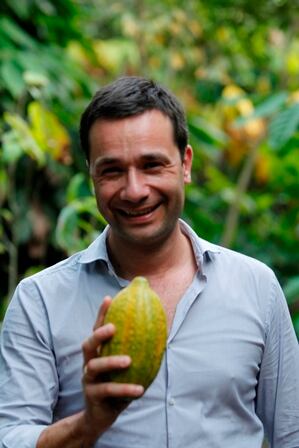The pilot includes three main areas: Increasing cocoa farmers’ income, reducing child labor and carbon emissions, according to Barry Callebaut.
“We will create and test individual multi-year farm development plans (FDPs), which include productivity packages, replanting services and financing solutions,” said Oliver von Hagen, sustainability manager of global sourcing at Barry Callebaut. “FDPs are designed to be work plans which enable farmers to develop their farms.”

"It’s a fair assumption that Indonesia has fewer child labor cases."
Additionally, “the pilot will focus on low carbon technologies and carbon sequestration, the capture and storage of carbon so that it is not released into the atmosphere”, von Hagen said.
He added: “The launch of the pilots is the formal start for the collection of the data we need to measure baseline and progress, and identify critical impact factors.”
Similar pilots will start in other cocoa supplying nations in coming months including Côte d'Ivoire, Ghana, Cameroon, and Brazil, according to Barry Callebaut.
“Our goal for this year is to get all five pilots running and have first intermediate results towards the end of the year,” said von Hagen.
So how is the pilot different from Forever Chocolate? “Forever Chocolate sets our goals by 2025. The pilot is a laboratory – it’s where we actually implement in order to reach our targets, and it’s about creating a micro scale for systemic changes,” spokesperson Christiaan Prins explained.
Asked why it took more than a year for Barry Callebaut to carry out its first pilot after launching Forever Chocolate, Prins said “it’s a matter of preparing… We spent the past year working out how to bring those changes [to farmers]”.
‘Country-specific’ data will be available
Prins told ConfectioneryNews the company will use “country-specific” methodology for its pilot launch since Indonesian cocoa farmers face different challenges compared to their West African counterparts.
“They have different focal areas. The focus in Indonesia would be improving productivity, [while our sustainability efforts] in West Africa deal more with child labor,” he pointed out.
Barry Callebaut discovered 247 cases of the worst forms of child labor on global cocoa farms supplying its factories in 2016/2017, with 36% of its cocoa beans being sustainably sourced to its definition during the period, according to its first Forever Chocolate progress report.
The company does not breakdown region-specific data of child labor cases. “But I think it’s a fair assumption that Indonesia has fewer child labor cases,” Prins said.
He said Wageningen University and Research would help implement Barry Callebaut’s Indonesia pilot, alongside local associates, Ani Setiyonimgrum and Rudyanto Hady.
“[The university] will also support us in establishing the baseline and tracking the program,” he added.
Prins said when its next Forever Chocolate progress report is published in early November 2018, all Forever Chocolate pilots will be launched. The report will also include data of each pilot so regional progress on sustainability will be available.
